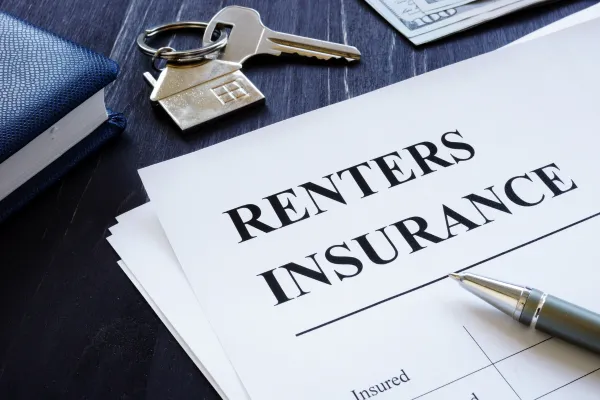
Did you know many renters are at risk of financial loss without proper protection?

This is where a renters insurance policy comes in. It acts as a safety net against unexpected events like theft, fire, and water damage.
As a renter, you're not just renting a home. You're also responsible for your belongings and any legal issues that might come up. A renters insurance policy can cover your personal items, temporary living costs, and personal liability. This ensures you're safe from financial loss.
"What many first-time renters fail to recognize is that renters insurance isn't just financial protection—it's emotional security in an increasingly unpredictable housing market. The true value proposition extends beyond replacing stolen electronics or covering liability; it's about creating stability in a rental journey where tenants often feel they lack control. When we advise clients at Clara, we emphasize that the $15-20 monthly investment provides something far more valuable than coverage limits: it provides the freedom to truly make a rental feel like home without the constant worry about 'what ifs.' This psychological benefit is particularly crucial for today's renters who are staying in rental housing longer than previous generations due to housing affordability challenges."
Taylor Wilson, CEO of Rent with Clara
First-time renters often overlook the importance of renters insurance. It's a key step in securing your financial future. Many think their landlord's insurance covers their stuff, but it doesn't.
Many first-time tenants mistakenly believe their landlord's insurance covers their personal belongings, but landlord's insurance won't protect your stuff. Tenants insurance is a policy that provides financial protection for your possessions against theft, fire, vandalism, and other covered perils.
Beyond protecting your belongings, it includes medical payments coverage if someone gets injured in your home, and covers your belongings even when they're stolen from your car. Most landlords require you to have renters insurance as part of your lease agreement, and given how affordable renters insurance cost typically is—often less than a dollar per day—it's a smart investment that gives you peace of mind.

The key distinction between homeowners and renters policies lies in what's covered. Homeowners insurance protects the building's structure, while tenants insurance focuses solely on your personal property and liability since your landlord is responsible for insuring the physical dwelling.
Both policies cover losses from similar perils and provide liability protection, but as a tenant, you don't need to buy renters insurance that includes structural coverage. This is precisely why renters insurance is usually much more affordable than homeowners insurance—you're only protecting your belongings and liability exposure, not an entire building.
Understanding these differences is crucial for first-time renters to ensure they have the right coverage.
Renters insurance offers protection for personal belongings, liability, and additional living expenses. It's key for renters to understand these areas well. This ensures they have the right coverage.

Your basic renters policy covers your belongings against damage or loss from events like theft, fire, and vandalism. This protection extends to furniture, electronics, clothing, and more—essentially everything you'd need to replace your belongings if disaster struck.
The value of your items determines how much coverage you need, so it's worth figuring out what your belongings are worth before selecting coverage limits. Keep in mind that standard insurance doesn't cover flood damage, so if you live in an area prone to flooding, you'll need to explore the National Flood Insurance Program for separate flood coverage.
If a guest is injured on your rental property and decides to sue, your policy will pay for legal defense costs and any settlements or judgments up to your coverage limit. This insurance that covers liability incidents protects your financial assets from potentially devastating lawsuits.
Unlike car insurance, which handles vehicle-related incidents, your renters liability coverage applies to accidents that occur within your rental unit and sometimes even extends to incidents you cause outside your home.
When your rental becomes uninhabitable due to losses due to fire or other covered events, your policy will pay for temporary housing and related expenses. This additional coverage typically includes hotel bills, restaurant meals, and other necessary costs you wouldn't normally incur.
The insurance company will pay these expenses—sometimes called loss of use coverage—until your apartment is livable again or your lease ends, whichever comes first.
Theft, vandalism, and accidental damage are common issues renters insurance can help with. It offers financial protection against many risks. This means you won't have to pay a lot of money when unexpected things happen.
When thieves break into your apartment or vandals damage your property, covered by renters insurance you can file a claim to replace your belongings. Your company will pay for stolen or damaged items up to your coverage limit, minus your deductible.
Many people don't realize that coverage extends beyond your apartment walls—items stolen from your car or taken while you're traveling are typically covered too. Just remember to file a police report promptly and document everything with photos and receipts to support your claim.
Key benefits of renters insurance in cases of theft or vandalism include:
From kitchen fires to damage from a burst pipe, these disasters can destroy your possessions in minutes. Your renters insurance pays for hotel stays and meals while repairs are being made, and it covers losses to your personal property as well.
The policy typically covers losses from sudden water damage like burst pipes, though it won't cover flood damage from external sources—that requires separate flood coverage through the National Flood Insurance Program. Working with your insurance agent to make a claim quickly helps expedite the replacement process.
For more detailed information on renters insurance and how it can protect you, visit Goodcover's Insurance Guide.
If a friend trips over your rug and breaks their wrist, you could face thousands in medical bills and legal fees. Your medical payments coverage helps pay for immediate medical expenses without waiting for a lawsuit, while the liability portion protects your belongings and savings if they decide to sue.
Insurance companies offer different liability limits, but most experts recommend at least $100,000 in coverage. Without this protection, you'd be paying these costs out-of-pocket, which is why insurance you need should always include adequate liability coverage.
Understanding renters insurance policies is key to making a smart choice. You need to consider a few important things. This ensures you get the right protection without spending too much.
Before shopping for a policy, document everything you own by taking photos and keeping receipts for major purchases. This inventory helps you determine how much coverage you need renters insurance to provide and proves the value of your items if you need to file a claim.
Walk through each room and list every item, from furniture and electronics to clothing and kitchenware. Most people are surprised to discover their belongings are worth far more than they initially thought—often totaling $20,000 to $50,000 or more.
Replacement cost insurance may cost slightly more, but it pays for new items at today's prices without accounting for depreciation. Actual cash value coverage, while cheaper, only pays what your items are worth after depreciation—meaning that a five-year-old laptop might only net you a fraction of what you need for a replacement.
For most renters, the extra cost of replacement coverage is worth it since the policy will pay enough to actually replace what you lost rather than leaving you to cover the difference out-of-pocket.
Your deductible is the amount you pay before your insurance company will pay the rest of your claim. Higher deductibles mean lower monthly premiums, but you'll need that cash available if disaster strikes.
Balance this with your coverage limits—the maximum your policy will pay for covered losses. Most basic renters policies start around $20,000 in personal property coverage, but you might need more depending on what you own.
Standard renters policies exclude flood and earthquake damage, so if you live in an area prone to these disasters, you'll need separate policies. The National Flood Insurance Program provides flood coverage that protects against rising water and storm surge.
High-value items like jewelry, art, or collectibles often have coverage limits in basic policies, requiring endorsements or separate policies to fully protect your belongings. Talk to your insurance agent to make sure you understand what's covered and what needs additional coverage.
Renters insurance isn't just another bill—it's financial protection that covers losses from theft, fire, liability lawsuits, and dozens of other scenarios that could otherwise devastate your finances. Whether it's a small fire causing damage to the unit and your belongings, or a guest injury leading to a lawsuit, having the right insurance that covers these risks means you're prepared for life's unexpected moments.
Take time to inventory your possessions, understand what your belongings are worth, and choose a policy that provides adequate coverage for your situation. While your landlord's insurance won't cover your personal property, a solid renters policy ensures you won't face financial hardship when the unexpected happens.
Don't wait until it's too late—get the insurance you need today and sleep better knowing you're protected.